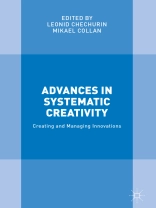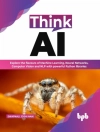This book presents a collection of the most current research into systemic creativity and TRIZ, engendering discussion and the exchange of new discoveries in the field. With chapters on idea generation, decision making, creativity support tools, artificial intelligence and literature based discovery, it will include a number of instruments of inventive design automation. Consisting of 15-20 chapters written by leading experts in the theory for inventive problem solving (TRIZ) and adjacent fields focused upon heuristics, the contributions will add to the method of inventive design, dialogue with other tools and methods, and teaching creativity in management education through real-life case studies.
表中的内容
Part I Advances in Theory and Applications of TRIZ.- 1 Current Stage of TRIZ Evolution and Its Popularity.- 2 Design for Change: Disaggregation of Functions in System Architecture by TRIZ-Based Design.- 3 Systematic Innovation in Process Engineering: Linking TRIZ and Process Intensification.- Heuristic Problems in Automation and Control Design: What Can Be Learnt from TRIZ?.- 5 The Adaptive Problem Sensing and Solving (APSS) Model and Its Use for Efficient TRIZ Tool Selection.- 6 Case: Can TRIZ Functional Analysis Improve FMEA?.- 7 A TRIZ and Lean-Based Approach for Improving Development Processes.- 8 A Method of System Model Improvement Using TRIZ Function Analysis and Trimming.- 9 Function Analysis Plus and Cause-Effect Chain Analysis Plus with Applications.- Part II Advances in Tools and Technologies for Creating New Innovations.- 10 Identification of Secondary Problems of New Technologies in Process Engineering by Patent Analysis.- 11 Control Design Tools for Intensified Solids Handling Process Concepts.- 12 Anticipatory Failure Determination (AFD) for Product Reliability Analysis: A Comparison Between AFD and Failure Mode and Effects Analysis (FMEA) for Identifying Potential Failure Modes.- 13 Computer-Aided Conceptual Design of Building Systems: Linking Design Software and Ideas Generation Techniques.- 14 Optimized Morphological Analysis in Decision-Making.- 15 Engineering Creativity: The Influence of General Knowledge and Thinking Heuristics.- Part III Advances in Managing Innovations and the Innovation Process.- 16 Levelized Function Cost: Economic Consideration for Design Concept Evaluation.- 17 Reflecting Emotional Aspects and Uncertainty in Multi-expert Evaluation: One Step Closer to a Soft Design-Alternative Evaluation Methodology.- 18 Using Innovation Scorecards and Lossless Fuzzy Weighted Averaging in Multiple-criteria Multi-expert Innovation Evaluation.- 19 Innovation Commercialisation: Processes, Tools and Implications.
关于作者
Leonid Chechurin is Professor at the Industrial Management Department of Lappeenranta University of Technology, Finland. He is also the Head of the System Engineering group at LUT, and Visiting Professor at St. Petersburg State Polytechnic University, Russia. His research interests focus on the analysis of systems dynamics based on mathematical modelling, stability analysis, control, the systematic approach for inventive thinking and innovation automation tools.
Mikael Collan is Professor of Strategic Finance at Lappeenranta University of Technology, Finland. His research concentrates on business decision-making under uncertainty. Mikael is past President of the Finnish Operations Research Society (FORS) and an ordinary member of the Finnish Society of Sciences and Letters, one of the Finnish Academies of Science.












